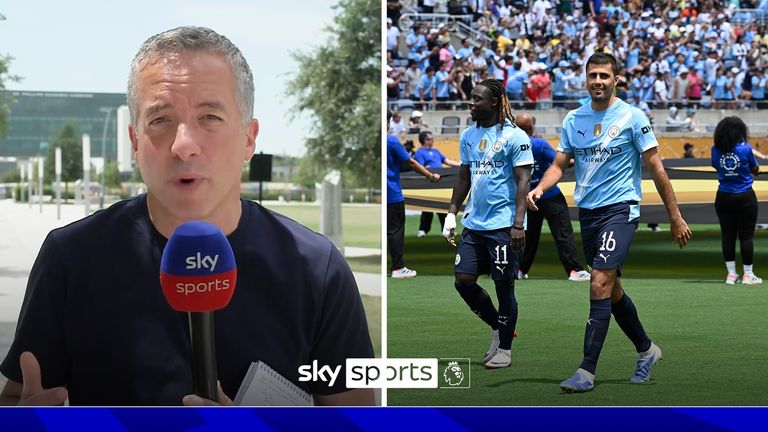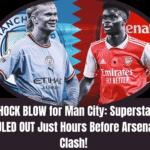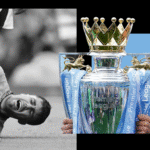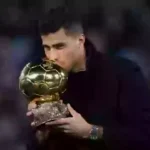Why Rodri missed Man City vs Burnley as new target set

Manchester City’s approach to managing Rodri’s return from injury represents one of the most significant tactical and medical challenges facing Pep Guardiola’s squad this season. The Spanish midfielder’s absence from the Premier League clash against Burnley at the Etihad Stadium highlighted the delicate balancing act between competitive necessity and long-term player welfare that has become a defining characteristic of modern football management.
The Rodri Conundrum: A Player Too Valuable to Risk
Rodri’s importance to Manchester City cannot be overstated. The Ballon d’Or winner has established himself as the fulcrum around which Guardiola’s tactical system revolves, providing the defensive stability and progressive passing that allows City’s attacking players to flourish. His absence from the Burnley fixture marked the second consecutive game he has missed, following his non-involvement in the Carabao Cup tie against Huddersfield Town in midweek.
The decision to rest Rodri comes against the backdrop of a grueling schedule that saw him start three consecutive matches in the previous week. His appearances against Manchester United in the derby, Napoli in the Champions League, and Arsenal in what many considered a title-deciding clash at the Emirates Stadium, demonstrated both his resilience and his indispensability to City’s tactical setup. Each of these fixtures carried enormous significance, with the United game providing local bragging rights, the Napoli match offering crucial European points, and the Arsenal encounter potentially shaping the Premier League title race.
However, the cumulative effect of these high-intensity performances has taken its toll on a player who is still navigating his way back from serious injury concerns. The specter of his ACL injury from September of the previous year continues to loom large over team selection decisions, serving as a constant reminder of how quickly a player’s career trajectory can change and how one moment of overexertion can lead to months of rehabilitation.
The Medical Timeline: Understanding Rodri’s Journey Back
Rodri’s injury history provides crucial context for understanding City’s cautious approach to his minutes management. The ACL injury he suffered in September represented one of the most serious setbacks of his career, requiring extensive rehabilitation and careful monitoring of his physical condition. ACL injuries are notoriously complex, often requiring not just the healing of the initial damage but also the rebuilding of confidence in the affected joint and the restoration of the dynamic movement patterns that elite football demands.
Complicating matters further was the groin problem that developed after the Club World Cup, sidelining him for six weeks and adding another layer of complexity to his recovery process. Groin injuries in midfielders are particularly problematic due to the constant twisting, turning, and sudden directional changes required in central areas of the pitch. The fact that this secondary injury occurred during what should have been a period of gradual return to full fitness suggests that City’s medical team is dealing with a player whose body is still adapting to the demands of elite competition.
The decision-making process around Rodri’s availability reflects modern football’s increasingly sophisticated approach to sports science and player welfare. Gone are the days when players would simply play through pain or when clubs would prioritize short-term results over long-term player health. Instead, City appears to be following a carefully calibrated plan that considers not just Rodri’s immediate fitness but also his availability for the crucial fixtures that lie ahead.
Strategic Squad Management: The Monaco Target
Manchester City’s targeting of Rodri’s return for the Champions League fixture against Monaco represents a calculated gamble that speaks to the club’s prioritization of different competitions. While the Premier League remains the primary domestic objective, the Champions League continues to be the ultimate prize that has eluded City in recent seasons, despite their domestic dominance.
The Monaco match presents an ideal scenario for Rodri’s return for several reasons. First, it allows City to rest him for a Premier League fixture against opposition they would expect to defeat even without their star midfielder. Second, it provides a controlled environment for his comeback, with Champions League matches often offering more tactical predictability than the chaotic nature of some Premier League encounters. Third, it aligns with City’s broader strategy of treating the Champions League as their ultimate objective, requiring their best players to be available for crucial European fixtures.
The European competition’s importance to City cannot be understated. Despite their domestic success under Guardiola, the Champions League has remained frustratingly elusive, with disappointments in recent seasons serving as painful reminders of how fine the margins are at the highest level. The decision to potentially sacrifice Rodri’s involvement in domestic fixtures to ensure his availability for European competition reflects this prioritization and suggests that City view the Champions League as their primary route to cementing Guardiola’s legacy at the club.
Tactical Implications: Life Without Rodri
The absence of Rodri from City’s lineup creates a domino effect that extends far beyond the simple replacement of one player with another. His unique skill set – combining defensive screening, progressive passing, and tactical intelligence – is virtually impossible to replicate, forcing Guardiola to adjust his tactical approach significantly when the Spaniard is unavailable.
Nico Gonzalez’s selection as Rodri’s replacement provides insight into how Guardiola views the position and what qualities he prioritizes when forced to adapt. The young midfielder’s inclusion represents both an opportunity and a challenge, offering him valuable experience at the highest level while simultaneously testing City’s tactical flexibility.
Guardiola’s extensive communication with Gonzalez during matches reflects the complexity of the role Rodri typically fills. The Spanish coach’s detailed instructions and constant guidance suggest that the position requires not just technical ability but also tactical maturity and decision-making skills that typically come with extensive experience. The fact that Guardiola feels the need to provide “several lengthy debriefs” indicates both the complexity of the role and Gonzalez’s willingness to learn and adapt.
The tactical adjustments required in Rodri’s absence often ripple throughout the team’s structure. Without his defensive screening, City’s center-backs may find themselves more exposed to counter-attacks. Without his progressive passing, the team may struggle to break through compact defensive blocks. Without his tactical intelligence, City may find themselves less able to control the tempo and rhythm of matches, potentially leading to more chaotic, end-to-end encounters that don’t necessarily favor their style of play.
Youth Integration: The Academy Pipeline
The situation surrounding Rodri’s absence has also highlighted City’s impressive academy pipeline and Guardiola’s willingness to trust young players in significant moments. The inclusion of Divine Mukasa on the bench, following his senior debut against Huddersfield, represents the kind of opportunity that can accelerate a young player’s development exponentially.
Similarly, the potential involvement of Ryan McAidoo speaks to the club’s confidence in their youth development system and Guardiola’s track record of integrating academy products into the first team. The possibility of McAidoo becoming “the fourth academy player to make his debut in a week” suggests that City’s injury concerns are creating unexpected opportunities for the next generation of players.
This youth integration serves multiple purposes beyond simply filling squad numbers. It provides valuable experience for young players who might otherwise spend years waiting for their chance, offers Guardiola additional tactical options and fresh legs for a demanding schedule, and demonstrates the club’s commitment to developing homegrown talent in an era of increasing financial scrutiny and sustainability requirements.
The academy pipeline becomes particularly crucial during periods when key players are managing their way back from injury. Rather than rushing established players back prematurely or making expensive emergency signings, City’s approach of trusting their youth development system reflects both long-term planning and confidence in their coaching methods throughout the organization.
The Broader Context: Modern Football’s Injury Management
City’s approach to managing Rodri’s return reflects broader trends in modern football regarding player welfare and injury prevention. The sport has become increasingly aware of the long-term consequences of rushing players back from serious injuries, with numerous high-profile cases serving as cautionary tales about the importance of patience in rehabilitation processes.
The decision to potentially sacrifice short-term results for long-term player health represents a philosophical shift in how elite clubs approach squad management. This approach requires significant confidence in squad depth and tactical flexibility, as well as a willingness to accept occasional disappointments in less crucial fixtures to ensure availability for more important matches.
The medical and sports science teams at elite clubs now wield significant influence over team selection decisions, with their recommendations often overriding purely tactical considerations. This shift reflects the enormous financial investments clubs make in their players and the recognition that protecting these assets requires sophisticated medical oversight and conservative decision-making.
Competitive Implications: The Title Race Context
Rodri’s absence comes at a crucial point in City’s season, with the Premier League title race beginning to take shape and their Champions League campaign requiring careful navigation. The decision to rest him against Burnley, while tactically sound from a player management perspective, carries inherent risks in a competitive environment where every point matters.
The timing of his potential return against Monaco could prove crucial for City’s European ambitions. The Champions League has undergone format changes that make early points more valuable than ever, and City’s ability to secure victories in their opening fixtures could determine their path through the competition. Having Rodri available for these crucial European fixtures could be the difference between a comfortable progression to the knockout stages and a more challenging route that requires additional squad rotation and energy expenditure.
The broader competitive landscape also influences these decisions. With other title contenders managing their own injury concerns and tactical challenges, City’s ability to maintain their standards even when key players are unavailable could prove decisive over the course of a long season.
Looking Forward: Sustainable Success
The management of Rodri’s return represents a microcosm of the challenges facing modern football clubs in balancing immediate competitive demands with long-term sustainability. City’s approach suggests a mature understanding of these competing priorities and a willingness to make difficult short-term sacrifices for long-term benefits.
The success of this strategy will ultimately be judged by City’s ability to maintain their competitive standards across multiple competitions while ensuring that key players remain available for the most crucial fixtures. Rodri’s health and availability will likely play a significant role in determining whether City can achieve their objectives this season, making his careful management one of the most important ongoing stories of their campaign.
As the season progresses, the wisdom of City’s conservative approach to Rodri’s return will become clearer. If he remains healthy and available for crucial fixtures while the team maintains its competitive edge in his absence, it will validate their strategy. However, if his absence contributes to unexpected results or if rushing him back leads to further injury concerns, it will raise questions about the delicate balance between caution and ambition that defines modern elite football management.
The Rodri situation ultimately represents the sophisticated decision-making processes that have become essential to success at the highest level of football, where the margins for error are minimal and the consequences of poor player management can be severe and long-lasting.















